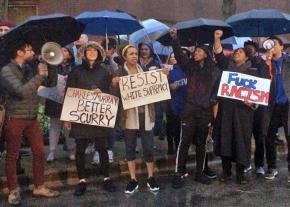Sending a message to a racist at DePaul
reports from Chicago on a protest that brought out DePaul students against right-wing speaker Charles Murray--and an ongoing debate about free speech.
WELL OVER 100 DePaul students, faculty and community members stood together in the rain on the evening of November 1 to protest a speech by debunked pseudo-scientist Charles Murray.
Murray's 1994 book The Bell Curve is infamous for arguing that people of color have lower IQ scores because of "genetic inferiority." Murray claims this, as opposed to structural racism, explains why people of color suffer from socioeconomic inequalities.
In a more recent book Coming Apart, he argues that impoverished whites are poor because of "genetic laziness." Murray's work has been used to justify austerity measures supported by both Republicans and Democrats.
Despite his theories being widely debunked, Murray has been peddling his discredited ideas on a recent speaking tour of colleges across the country, often hosted by right-wing campus groups. At Chicago's DePaul University, College Republicans invited Murray to speak, which immediately caught the attention of students and faculty alike.
Since protesters at DePaul disrupted a speech by Milo Yiannopoulos sponsored by the College Republicans in 2016, DePaul has been cracking down on student-run campus groups hosting outside speakers. In the case of Murray, the university limited the audience for the event to only registered students and had around 20 security guards on hand.

Nonetheless, students were not deterred. The DePaul branch of the International Socialist Organization and Students for Reproductive Justice put out a joint call for an organizing meeting. A group of approximately 25 people met on October 30--with the event and protest scheduled for just two days later on November 1.
DESPITE THESE constraints, student organizers were able to bring out as many as 150 people to demonstrate against Murray.
Over a dozen anti-racist students registered for the event, and when Murray's time came to speak, they walked out, making their stance on his hateful speech clear. Outside, they joined other activists, where chants of "D-E-P-A-U-L, give those racist bigots hell!" were loud enough for those inside to hear.
A speak-out then ensued, where students voiced their thoughts about Murray's attacks on marginalized people. Students called him out as fraud and cited austerity, pro-corporate policies, attacks on workers and unions, war and environmental racism as just some of the things used to attack people of color and the poor, leading to the impacts that Murray blames on "genetics."
There was particular debate over the issue of free speech on campus. Some felt that Murray shouldn't have been allowed to speak on campus, and that his work qualified as hate speech that should not be tolerated. Others felt that censorship of right-wing speakers would also lead to future censorship of left groups and actions.
Socialist organizers made the case that when we demand the administration silence Murray and speakers like him, it acts as a "double-edged sword." Bans enacted by those in authority would almost certainly lead to a clampdown free speech for not only the campus right, but also the left.
Recently, campus groups like Students for Justice in Palestine have been targets of censorship--a direct effect of administrative restrictions students' political speech.
Moreover, calls for censorship benefit right-wing groups, giving them an opportunity to claim that their rights are being infringed upon. We should avoid giving the right any chances to garner further sympathy for their causes.
But when right-wing provocateurs get a platform to speak, students and community members should have every right to exercise their own right to free speech. This includes organizing mass actions to make it clear that the majority of students will not tolerate bigotry on their campus. The DePaul Socialists have repeatedly called on right-wing groups to engage in formal debates--requests which have been repeatedly declined.
The protest against Murray at DePaul proves that activists do not need the administration to act for us. Of the approximately 80 people in attendance at Murray's lecture, only some 30 were members of right-wing campus groups. Meanwhile, at its height, as many as 150 anti-racist activists stood outside in solidarity against Murray and his supporters, easily outnumbering those who brought him to campus.
We will need to continue the fight against bigotry on our campuses. More are realizing the need to stand up against the injustices that the Trump administration is increasing.
As freshman student Ben Bradley stated, "We're going to need resistance--everyone's not just going to roll over and agree with it. The people out here want equal rights and fair treatment for all. Now's the time to be doing something. It doesn't matter if you're leftists or socialists. We can come all together and fight the right."


